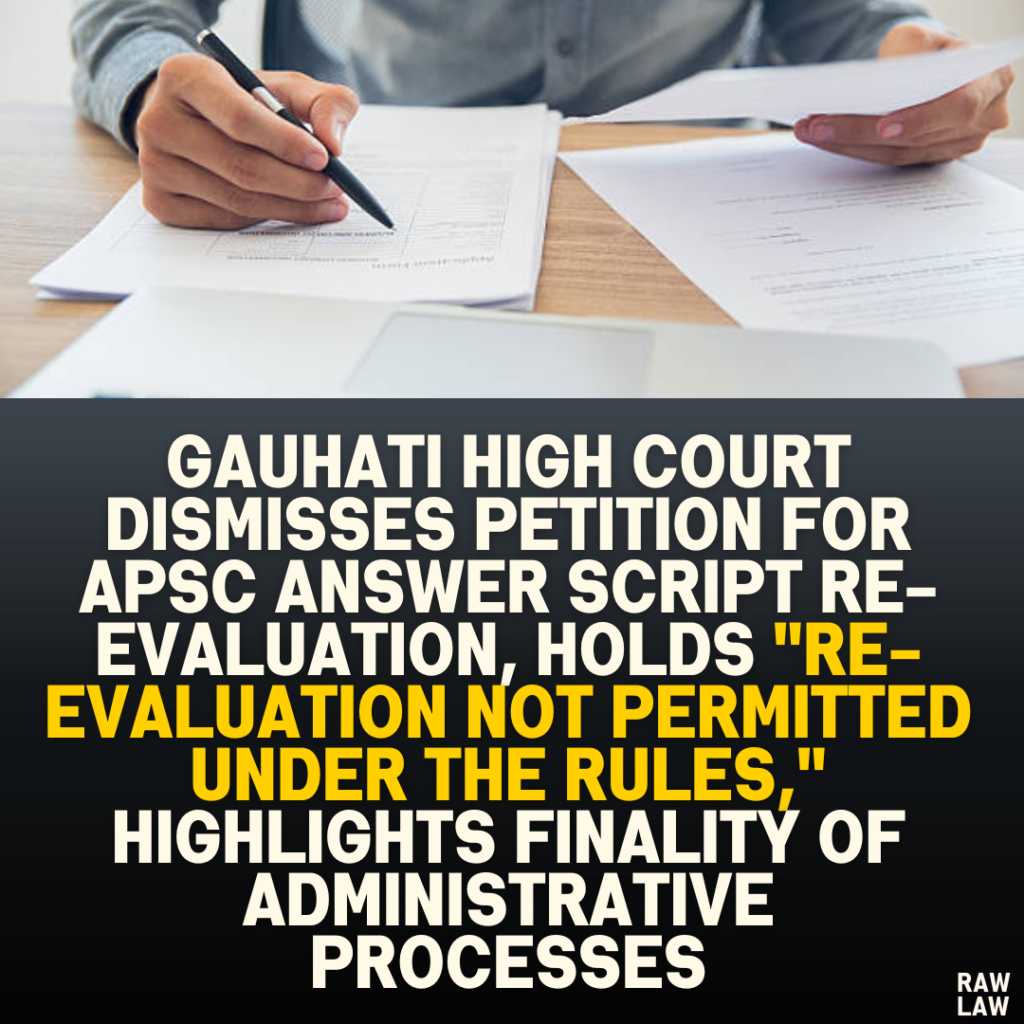Court’s Decision
The Gauhati High Court dismissed the petition seeking re-evaluation of the petitioner’s answer scripts for the Assam Public Service Commission (APSC) Combined Competitive (Main) Examination, 2013. The court found no merit in the petitioner’s claims and ruled that re-evaluation was explicitly barred under Rule 70(IV) of the APSC (Procedure & Conduct of Business) Rules, 2010. It also highlighted that reopening the selection process would create administrative chaos, given the appointments were already finalized.
Facts
- Examination Background:
- The APSC advertised vacancies for various government posts under the Combined Competitive Examination, 2013.
- The petitioner cleared the preliminary examination, appeared for the mains, and participated in the viva voce round, ultimately securing a merit-based selection for the post of Assistant Employment Officer.
- Grievance:
- The petitioner was dissatisfied with his merit position and believed he was entitled to a higher-ranking post based on his performance.
- He filed RTI applications seeking access to his answer scripts, which were later shown to him. However, he claimed the evaluation was flawed, alleging that many correct answers were left unmarked or improperly assessed.
- Relief Sought:
- Re-evaluation of his answer scripts under court supervision by an expert committee.
- Revision of the merit list if his re-evaluated score showed improvement.
- Interim relief to keep one post in the Assam Civil Services vacant until the matter was resolved.
Issues
- Re-Evaluation Bar: Whether the rules governing the APSC examination allowed for re-evaluation or review of answer scripts.
- Judicial Intervention: Whether the petitioner’s grievances warranted judicial intervention in the concluded selection process.
Petitioner’s Arguments
- The petitioner alleged casual and improper evaluation of his answer scripts, stating that many of his correct answers were either unmarked or inadequately scored.
- He argued that re-evaluation was necessary to ensure justice and fairness in the selection process.
- He sought judicial orders to revise his merit position, thereby granting him a higher-ranking post.
Respondent’s Arguments
- Rules Bar Re-Evaluation: The respondents contended that Rule 70(IV) of the APSC (Procedure & Conduct of Business) Rules, 2010, explicitly prohibits re-evaluation or re-examination of answer scripts.
- Timely Furnishing of Answer Scripts: They stated that the petitioner’s answer scripts were provided to him during the pendency of the proceedings, but he failed to bring them on record or substantiate his claims with evidence.
- Completion of Process: The respondents argued that the selection process was already completed, successful candidates were appointed, and they had joined their respective services. Reopening the process would be impractical and disrupt administrative efficiency.
Analysis of the Law
- Rule 70(IV) of the APSC Rules: This rule forms the crux of the case, as it explicitly bars the re-evaluation or re-examination of answer scripts by the Commission or any other authority. The petitioner’s request for re-evaluation was, therefore, contrary to the established legal framework.
- Judicial Precedents: While the judgment does not explicitly mention prior cases, courts generally refrain from interfering with administrative decisions when procedural rules are clear, and significant time has elapsed since the completion of the process.
Precedent Analysis
Although no specific judgments are cited in this case, the court followed the broader principle that:
- Administrative Finality: Courts are cautious about interfering with concluded administrative processes, especially when such interference would unsettle appointments and disrupt governance.
- Adherence to Procedural Rules: Courts respect procedural rules explicitly barring certain actions, such as re-evaluation of answer scripts in this case.
Court’s Reasoning
- Bar on Re-Evaluation:
- The court held that Rule 70(IV) unequivocally prohibits re-evaluation or review of answer scripts. Therefore, the petitioner’s demand was procedurally untenable.
- Impracticality of Relief:
- The court noted that granting relief would require reopening the entire selection process, causing administrative disruption.
- The appointments of other successful candidates would be jeopardized, which is impermissible after a significant lapse of time.
- Vague Allegations:
- The court found the petitioner’s allegations of improper evaluation to be vague and unsupported by evidence. The petitioner failed to substantiate his claim that correct answers were left unmarked.
- Timing of the Petition:
- The court observed that the petition was filed after the selection process had concluded and appointments had been made. This delay further weakened the petitioner’s case.
Conclusion
The court dismissed the petition, holding that:
- The relief sought was barred under the rules governing the APSC examination.
- The petitioner’s grievances were vague and unsupported by evidence.
- Judicial interference at this stage would disrupt the settled administrative process and was thus unwarranted.
No costs were imposed.
Implications
This judgment reaffirms the principle that:
- Administrative Processes Must Be Respected: Courts are reluctant to interfere with recruitment and selection processes, especially when they are governed by clear procedural rules.
- Rule-Based Governance: Explicit procedural bars, such as those prohibiting re-evaluation, are crucial to maintaining fairness and finality in public examinations.
- Timeliness of Grievances: Candidates must raise grievances promptly and substantiate them with evidence, as delayed and unsupported claims are unlikely to succeed.
This decision serves as a reminder to candidates that the judiciary cannot be invoked to bypass explicit procedural rules or disrupt concluded administrative processes.
